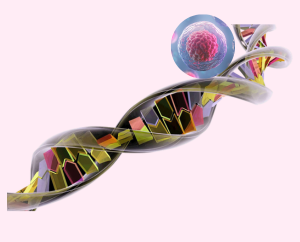
Epigenetic state of stem cells
The epigenetic state plays a fundamental role in the regulation of stem cell gene activity. Epigenetic modifications are chemical changes that occur at the level of DNA and its surrounding proteins, without altering the DNA sequence itself. These modifications act as switches that activate or deactivate genes, thus influencing cell differentiation and behavior, as in the case of methylation where a methyl group is added to a cytosine, acetylation and phosphorylation. This can repress gene expression by preventing the binding of transcription factors.
In the context of stem cells, epigenetic status is particularly important for the following reasons:
-
Maintaining pluripotency : In pluripotent stem cells, telles que embryonic stem cells et induced stem cells (iPS), the epigenetic state maintains the expression of genes associated with pluripotency while repressing the expression of genes related to the differentiation. This enables these cells to remain undifferentiated and retain their potential to differentiate into various cell types.
-
Cellular differentiation: Pendant cellular differentiation of stem cells in specific cell types, epigenetic modifications direct this process by selectively activating and deactivating the genes required for differentiation. For example, transcription factors specific to a target cell type can modify the epigenetic status of genes involved in the formation of that cell type.
-
Maintaining cellular identity : Once the stem cells have differentiated into specialized cell types, epigenetic modifications help maintain the identity and specific functions of these cells. They enable a muscle cell, for example, to stay alive by repressing genes characteristic of other cell types. Cell types, also proteins present on the cell surface, such a antigens et les receptors. For example, CD markers (differentiation cluster) are commonly used to identify different types of immune cells. Each cell type produces proteins specific to its function. For example, troponin is a specific cardiac protein used as a biomarker in cardiac tests.
-
Response to environmental signals : Epigenetic modifications can also be altered in response to environmental cues, such as growth factors or conditions of stress genes, such as heat shock, cytokines secreted by other cells in their microenvironment and intracellular signalling proteins (MAPK, PI3K-Akt et Wnt). This enables stem cells to adapt to the body's changing needs.
-
MicroRNA (miRNA) : MiARN are small non-coding RNAs that regulate gene expression by binding to messenger RNA (mRNA) and inhibiting its translation into proteins. miRNAs play a role in the fine regulation of gene expression and can influence stem cell differentiation decisions.
-
Chromatin and three-dimensional structure: The organization of chromatin (DNA wound around histone proteins) and three-dimensional DNA structure also play a role in stem cell gene regulation. Certain proteins, such as CTCF, facilitate interactions between specific DNA regions. Long non-coding RNAs (lncRNAs) are also involved in regulating the three-dimensional structure of chromatin by interacting with target regions.
Major epigenetic modifications include DNA methylation and histone modifications, which can influence the access of transcription factors to gene regulatory regions. Studying the epigenetic state of stem cells helps researchers better understand the gene regulatory mechanisms that control their differentiation and function, as well as their potential for regenerative medicine and cellular therapies.

